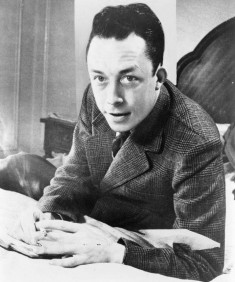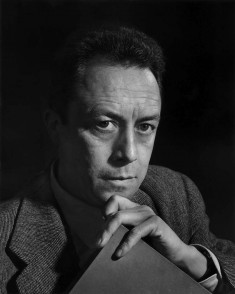| Albert Camus | |
|---|---|
 |
|
| Philosopher | |
| Specialty | Nihilism, existentialism |
| Born | Nov. 7, 1913 Dréan, El Taref, French Algeria |
| Died | Jan. 4, 1960 (at age 46) Villeblevin, Yonne, Burgundy, France |
| Nationality | French |
Albert Camus was a French intellectual and influential philosopher who was awarded the Nobel Prize for Literature in 1957. The novels he left behind after a tragic death at the age of 46 are considered among some of the most important literary works of the 20th century.
In addition to writing and developing cutting-edge ideas of post-modern thought, Camus was a man of intense political involvement and action. He was a prolific social critic. He is often associated with Communism, but his “brand” of Communism was at odds with the mainstream elements of that system, such as the Soviet brand of Communism. It is perhaps more accurate to think of Camus as an anarchist who hated totalitarian regimes. He believed people deserved to live in freedom and equality.
Early Years of Camus
Albert Camus was born in 1913 in French Algeria. He is identified as a Pied-Noir which is a term used to describe people of French nationality who lived in the former French protectorates of northern Africa. His father, Lucien, was a lower-class agricultural worker. His mother, Catherine Helene Sintes, was of Spanish descent.
The family lived in a two-room home with a dirt floor. Lucian was killed fighting in World War I, which meant that Albert would grow up in even poorer conditions. He barely knew his father. Mrs. Camus was often sick and nearly deaf. She struggled to raise her two children. Albert had an older brother, Lucien.
Schooling Years
School and education were the salvation of young Albert as he grew up in dreary poverty. He enjoyed his schoolwork with enthusiasm. His teachers recognized him as a student with special abilities, especially in writing and interpreting literature. When one of his teachers learned of his impoverished background, he was amazed that such a brilliant student was of such humble circumstances.
Camus’ sharp mind earned him a scholarship to attend the University of Algiers. There he completed what is the equivalent of a master’s degree in philosophy. He also excelled in football (soccer). Camus considered playing football to be among the greatest joys of his life.
Poor Health and Writing
 Camus contracted tuberculosis in 1930 which ended his participation in football. After college, Camus joined the Communist Party and worked as a writer, journalist, and political activist. He was also active in theater and wrote a number of plays.
Camus contracted tuberculosis in 1930 which ended his participation in football. After college, Camus joined the Communist Party and worked as a writer, journalist, and political activist. He was also active in theater and wrote a number of plays.
As he wrote news stories and political tracts, Camus also began to produce considerable works of fiction, including short stories and novels.
His first novel, The Stranger, was published in 1942. He went on to write The Plague, published in 1947, and The Fall, 1956. Two novels were published after his death, A Happy Death, issued in 1971, and The First Man, in 1995. He was awarded the Nobel Prize for Literature in 1957.
The Philosophy of Camus
The novels of Albert Camus reflect his strange and rather unique philosophy, which has been often misunderstood. Many people still categorize Camus as an existentialist similar to Jean-Paul Sartre, but both Camus and Sartre are known to have expressed surprise that anyone would place them in the same camp.
Camus’ “absurdity” involves difficult concepts to grasp because much of what it proposes seem contradictory and paradoxical. Camus believed that life was almost certainly meaningless, and yet, he argued that people should live their lives as though they truly did have meaning.
Camus also said that it is foolish for people not to expect pain and sorrow in life, which he said are a natural consequence of being alive. On the other hand, he argued it is equally important to recognize that life can be joyful and happy. He suggested that we appreciate the happy times and not focus on the dark times. Camus said that neither quality is permanent – that dark times always give way to brighter times. He believed that people should frankly acknowledge and embrace both.
Camus also seems contradictory in that he suggests an atheist might also “long for salvation and meaning.” He was deeply influenced by the Christian philosopher St. Augustine, and also the ancient Greek Neoplatonist, Plotinus. Camus believed every person’s direct experience was of the utmost importance to each individual.
Politically, Camus identified himself as an anarchist, which grew out of a fundamental grounding in a benign form of Communism. He was extremely opposed to dictatorial regimes and nations suffering under the rule of totalitarianism.
Camus’ Controversial Death
Albert Camus was killed in a car crash in 1960 near Villeblevin, France. At the time, he was a world-respected writer and philosopher. He had won the Nobel Prize less than three years earlier. He was a celebrated figure in France, where he had lived most of his adult life after moving there from Algeria. A case has been made that his tragic death was not an accident but engineered by the Soviet KGB, although this is highly controversial.
At the time of his death, he was married to his second wife, Francine Faure, with whom he had twin daughters, Catherine and Jean. He was previously married a short time to Simone Hie.